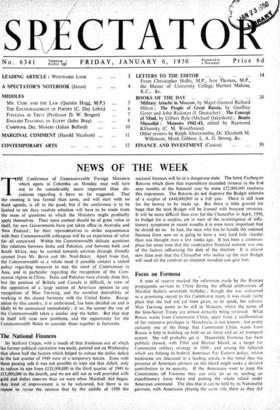The National Finances
Sir Stafford Cripps, with a touch of that frankness out of which his former political reputation was made, pointed out on Wednesday that about half the factors which helped to reduce the dollar deficit in the last quarter of 1949 were of a temporary nature. Even with these passing aids it was not possible to wipe out that deficit, only to reduce its size from £131,000,000 in the third quarter of 1949 to L11,000,000 in the fourth, and we are still not as well provided with gold and dollar reserves than we were when Marshall Aid began. Any kind of improvement is to be welcomed, but there is no reason to revise the opinion that by the middle of 1950 the national finances will be in a dangerous state. The latest Exchequer Returns which show that expenditure exceeded revenue in the first nine months of the financial year by some £22,000,000 reinforce this impression. The Returns do not disprove the Budget estimate of a surplus of £448,000,000 in a full year. There is still time for the leeway to be made up. But there is little ground for hope that the next Budget will be framed with buoyant revenues. It will be more difficult than ever for- the Chancellor in April, 1950, to budget for a surplus, yet in view of the re-emergence of infla- tionary symptoms in recent months it is even more important that he should do so. In fact, the man who has to handle the national finances from now on is going to have a very hard task—harder than was thought even a few weeks ago. It has been a common- place for some time that the unattractive financial outlook was one of the factors influencing the date of the election. It is clearer now than ever that the Chancellor who makes up the next Budget will need all the comfort an electoral mandate can give him.






































 Previous page
Previous page